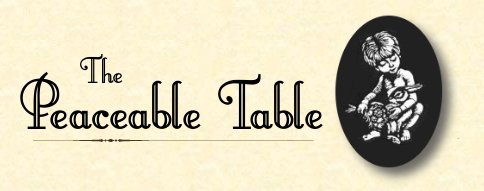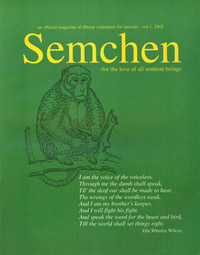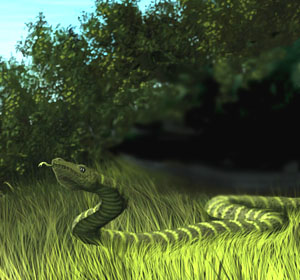Positive News from Britain

It is only too easy to be despondent and pessimistic about a perceived lack of progress in the field of animal protection and the promotion of their rights. We risk losing heart ourselves and what is worse, discouraging others — especially potential new campaigners — from entering the fray.
So I shall try to give a brief overview of the success we are seeing here in Britain.
First of all, the animal issue, whether it is termed "welfare," "protection/defence" or "rights," is constantly in the news. Much of the coverage is certainly not favourable. The more active — what the press would call "extreme" — campaigners may well not be too concerned about this. However, as Friends, we will all agree that the way in which we work, the "means to the end," is of vital importance.
To give an example of how attitudes are changing, the Cordon Vert school of The Vegetarian Society took their Professional Chef's Course "Catering for Vegetarians" to our Parliament in April 2005.
Three tutors trained ten House of Commons chefs, not only in the art of catering imaginatively for vegetarians, but also in what vegetarians actually do and don't eat. We will no doubt consider this is a very useful exercise, as there is much confusion in the wider world about what is and is not a sentient being. How many of us have been offered fish in restaurants, under the impression that this is acceptable to vegetarians?
Members of Parliament can now eat cruelty-free, knowing that their chefs have been trained by excellent staff. The Vegetarian Society is offering this facility to schools, local councils and other government bodies.
On the subject of education, the campaigning group Animal Aid trains speakers to provide talks on animal issues at secondary level. There are two ways into schools: Food Technology staff appreciate information on the vegetarian diet, partly from the viewpoint of nutrition and partly since the syllabus stipulates that students are aware of different "ethnic" food requirements. Secondly, in Personal and Social Education classes, the ethics of our exploitation of other species can be explored. We often find that, though the term "Animal Rights" is very familiar to students, probably because of sensational media coverage, the level of ignorance can be very high. It is not just the young, however, who find it difficult to connect a living animal with a cellophane-wrapped joint of meat, or, even more likely, with chicken nuggets and burgers. So there is useful work to be done here and a good rapport can be built up with schools over time.
To come to the political arena, in April 2004, the Dutch Green Left Party, Groen Links contacted us, in the Green Party, England and Wales, about their "Stop Lugging our Animals about!" petition.
According to the provisions of the European Constitution, if no fewer than one million citizens, coming from a significant number of member states, sign up to this appeal to limit journey times for animals transported for slaughter, that is, to a maximum of 6 hours or 400 kilometres, this request must go onto the Commission agenda. Over this year, we have managed to collect hundreds of signatures from all over the British Isles and the campaign has also been launched in France, Germany, Belgium and Ireland.
While on the subject of the Green Party, of which I am a member of campaigns committee, responsible for briefing them on animal issues, we are the only British political party to have a strong policy on Animal Rights and it is one of our key issues. Briefly, we are opposed to vivisection and blood sports, would phase out all factory farming, ban live exports and prohibit circuses from exploiting animals.
The European Union, though member states often criticise it, is bringing in several pieces of legislation affecting animals. The veal crate was the first factory farming system to be banned in Britain (1990) and we are glad to report that from 2007, it will be illegal in all 25 states. The battery cage, already banned in Switzerland and Austria, will also be banned EU — wide from 2012, though, unfortunately, an "enriched" cage, so called, will still be permitted, except by Germany. The sow stall, already illegal in Britain and Sweden — as it is in Florida, to the credit of campaigners there — will only be permitted for the first 4 weeks of the sows' pregnancies. There will also be prohibitions on the routine docking of piglets' tails and improvements introduced for the raising of pigs, in the form of foraging and nesting materials.
There is much public pressure and concern over intensive chicken farming, farrowing crates for lactating sows, the intensive fattening of pigs and the "enriched" cage for laying hens. As ever, improvements are slow to come into effect, but here again, the power of the media can help. The press and TV constantly cover food scares and reveal disturbing details of our children's diet and the obesity resulting from it, almost always involving meat. In the course of the month of July 2005, there were screened on national TV a very detailed programme made in a slaughterhouse, leading to the dismissal the following day of one of the more callous slaughtermen and two weeks later, another, Secrets of the Supermarkets, revealing the appalling conditions in which broiler chickens are kept, using undercover footage made by a leading animal investigations group. Another programme in this series was screened this week, on the intensive farming of ducks and the parlous state of dairy cows.
 Finally, to return to vegetarianism, this time linked with helping to feed the hungry, we have a wonderful group here called HIPPO — Help International Plant Protein Organisation. The Fowler family who runs this are experts in irrigation and have spent time in Africa. They designed and installed Ethiopia's first sub-surface drainage system in 1992. Longstanding vegans, Neville and Hazel set up HIPPO as a charitable trust and provide famine relief aid in the form of strictly vegetable foods, as well as assisting indigenous vegetarians to develop projects to grow their own protein, such as soya. As well as Ethiopia, HIPPO has helped in Uganda, Kenya, Nigeria and Malawi and has also sent soya protein to Croatia and Bosnia.
Finally, to return to vegetarianism, this time linked with helping to feed the hungry, we have a wonderful group here called HIPPO — Help International Plant Protein Organisation. The Fowler family who runs this are experts in irrigation and have spent time in Africa. They designed and installed Ethiopia's first sub-surface drainage system in 1992. Longstanding vegans, Neville and Hazel set up HIPPO as a charitable trust and provide famine relief aid in the form of strictly vegetable foods, as well as assisting indigenous vegetarians to develop projects to grow their own protein, such as soya. As well as Ethiopia, HIPPO has helped in Uganda, Kenya, Nigeria and Malawi and has also sent soya protein to Croatia and Bosnia.
Quaker Concern for Animals
Green Party, England & Wales.

 In practicing our Testimony of Peace & Nonviolence, vegetarian/vegan
Friends
can extend their consideration of peace to all life and not just
human relations. Each day that we are alive and breathing the air of Earth
we awake and nourish ourselves for the new day. When making choices for our
meals we impact many lives, some with voices who are able to speak for
themselves and some without voices who depend upon our compassion. When we
select a vegan breakfast, the Earth is protected from
over-industrialization and "farm" animals are spared cruelty. As humans
we have the power to begin each day peacefully and compassionately with the
hope of spreading the actions of peace throughout the day and around the
globe.
In practicing our Testimony of Peace & Nonviolence, vegetarian/vegan
Friends
can extend their consideration of peace to all life and not just
human relations. Each day that we are alive and breathing the air of Earth
we awake and nourish ourselves for the new day. When making choices for our
meals we impact many lives, some with voices who are able to speak for
themselves and some without voices who depend upon our compassion. When we
select a vegan breakfast, the Earth is protected from
over-industrialization and "farm" animals are spared cruelty. As humans
we have the power to begin each day peacefully and compassionately with the
hope of spreading the actions of peace throughout the day and around the
globe.
 1 1/2 cups organic unbleached flour
1 1/2 cups organic unbleached flour Alex the Lion lives in New York's Central Park Zoo, where he happily
entertains humans and is fed steaks. He has, of course, no idea of
what steaks really are or where they come from. In fact, his best
friend is a zebra named Marty. These animals are treated so well
that they can visit each other and socialize — something that does
not, of course, happen in real life, either in zoos or on the savannah..
Alex the Lion lives in New York's Central Park Zoo, where he happily
entertains humans and is fed steaks. He has, of course, no idea of
what steaks really are or where they come from. In fact, his best
friend is a zebra named Marty. These animals are treated so well
that they can visit each other and socialize — something that does
not, of course, happen in real life, either in zoos or on the savannah..
 This attractive magazine, and the movement behind it, are inspiring examples of what a single person can launch on behalf of animals. Semchen, of which only the premier issue has reached us, is the periodical of the Tibetan Volunteers for Animals, a movement begun by Rapsel Tsariwa, a Tibetan student in India. After witnessing horrific instances of animal slaughter for temple sacrifices and human consumption, he determined to live in a different way. He began by caring for stray dogs; slowly others joined him in this work, and extended their humanitarian service to other animals. As the Tibetan Volunteers for Animals, Rapsel and his friends distributed vegetarian booklets, produced a video, and finally traveled to schools, monasteries, and the Tibetan refugee settlements in India, offering presentations to thousands of people, and encouraging his hearers to make a life-long pledge to give up eating meat. Over 10,000 signatures have been presented so far. They were presented to the Dalai Lama on his 70th birthday, July 6, 2004.
This attractive magazine, and the movement behind it, are inspiring examples of what a single person can launch on behalf of animals. Semchen, of which only the premier issue has reached us, is the periodical of the Tibetan Volunteers for Animals, a movement begun by Rapsel Tsariwa, a Tibetan student in India. After witnessing horrific instances of animal slaughter for temple sacrifices and human consumption, he determined to live in a different way. He began by caring for stray dogs; slowly others joined him in this work, and extended their humanitarian service to other animals. As the Tibetan Volunteers for Animals, Rapsel and his friends distributed vegetarian booklets, produced a video, and finally traveled to schools, monasteries, and the Tibetan refugee settlements in India, offering presentations to thousands of people, and encouraging his hearers to make a life-long pledge to give up eating meat. Over 10,000 signatures have been presented so far. They were presented to the Dalai Lama on his 70th birthday, July 6, 2004.
 "He eats no meat. . ." This is Ralph Waldo Emerson, writing in 1865
about his late friend, Henry David Thoreau. Thoreau's vegetarianism
always has been controversial. Dudley Giehl, in Vegetarianism: A
Way of Life, lists Thoreau among inconsistent vegetarians. In The
Main Woods, Thoreau himself mentions eating moose, and in Walden
says past necessity forced him to eat fried rat. The moose incident
was in October of 1839, when he was only 22; we have no specifics
about the rat. Emerson wrote of Thoreau in maturity — what there was
of it, for the now famous philosopher, naturalist and writer died at
the age of 45. . . .
"He eats no meat. . ." This is Ralph Waldo Emerson, writing in 1865
about his late friend, Henry David Thoreau. Thoreau's vegetarianism
always has been controversial. Dudley Giehl, in Vegetarianism: A
Way of Life, lists Thoreau among inconsistent vegetarians. In The
Main Woods, Thoreau himself mentions eating moose, and in Walden
says past necessity forced him to eat fried rat. The moose incident
was in October of 1839, when he was only 22; we have no specifics
about the rat. Emerson wrote of Thoreau in maturity — what there was
of it, for the now famous philosopher, naturalist and writer died at
the age of 45. . . .
 A narrow fellow in the grass
A narrow fellow in the grass